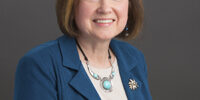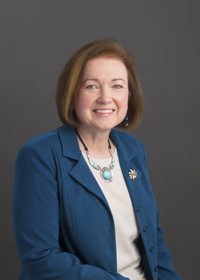Deb Rodahl, MBA, MLS(ASCP)CM, ASCLS President
{/textblock_content}[/yee_text_block][yee_button title=”Stream an interview with Deb and go more in-depth on constituent society leadership.” href=”https://www.ascls.org/images/ASCLS_Today/President_Interview/Rodahl_201803_FINAL.mp3″ color=”yee-btn-primary” size=”yee-btn-default” state=”” icon=”” icon_assign=”right” target=”_blank” rel=”” ex_class=”” style_detail=”” yee-widget-theme=”default” border_color=”” border=”none” visiable=”1″][/yee_button][yee_text_block css_animation=”no” ex_class=”” style_detail=”” yee-widget-theme=”default” border_color=”” border=”none” visiable=”1″]{textblock_content}
In my president’s acceptance speech, I noted that I plan to focus my efforts on areas that have been identified as a need in our organization: Leadership Development, Mentorship, Communication, and Professional Involvement. I noted that for several years we have heard from state and constituent societies that they are recycling their leaders and struggling to engage others to step forward to take on these roles. This is a significant concern for our Board of Directors. ASCLS is a grassroots organization that drives our success from the support and commitment of our grassroots – all of us! We are an organization that is run and managed by the practitioners in the clinical laboratory profession. This ensures we are relevant to the needs and desires of our members, which is why an important focus for this year needs to be strengthening our state/constituent societies.
One first step was a decision to revise the President-Elect Seminar held at the Annual Meeting. This session has traditionally been a 3 ½ hour event where a lot of content is shared in a venue commonly known as “the parade of committees.” While the information is important for our constituent society leaders, it is likely too much in one setting and difficult for participants to absorb it all. This year we piloted a new concept with our Constituent Society Leadership Institute where some of the content was pre-recorded and linked on the ASCLS Website. This will allow leaders to access these short modules at a time convenient for them and at times when it is needed. For example, a session on awards could be revisited at the time of year when award nominations are coming due. This allowed the live session to be more interactive for our attendees. Time was spent brainstorming a list of challenges that are experienced by our constituent societies followed by group breakouts to discuss and share solutions for these challenges. Many of the ideas that have come out of that session have actions in progress. In the future, this session will be open to all constituent society leaders that might be interested.
Another work in progress has been the work of the Root Cause Task Force led by Rick Panning. The focus of this task force is to establish the root cause for why constituent societies are struggling to fill open leadership positions and/ or recycling the same leaders. At the Annual Meeting, they shared the work that had been accomplished to date as well as their next steps. Recommendations were made to help correct the challenges including mentoring, developing clear expectations around roles, improved communications, asking members to get involved, and to boost our membership recruitment and retention campaigns.
The third approach to this is centered around our Leadership Academy. This committee graduated their 10th class this year, which is extremely noteworthy. However, a concern was shared that there is a declining number of applications for participation in the national academy. The original intent of the academy was to help develop future leaders for ASCLS constituent societies, particularly in states or regions of the country experiencing the greatest need. In fact, one of the leadership academy’s earlier projects was to develop a process for states and regions to develop their own local leadership academies. Several states or regions took advantage of that project and have successfully launched their own versions of leadership academies. Does this account for the lower interest in the national academy? Are we actually reaching the areas of greatest need? Should the regional/state academy curriculums be different from the national academy? These are just a few of the questions that need to be answered to be able to develop a better strategy for how to refocus the national leadership academy. To that end we are appointing a task force to review the “current state” and make recommendations for the questions posed and ultimately a plan for how to reach the desired “future state.”
Clearly, leadership support for our constituent societies will strengthen ASCLS. Additionally, there is a wonderful by-product of this work in that we will develop stronger constituent societies resulting in a stronger profession. I look forward to seeing this work come to fruition. It truly is my honor to serve as ASCLS President!

